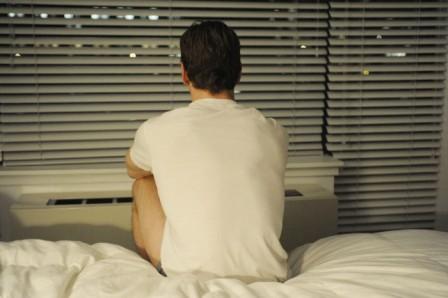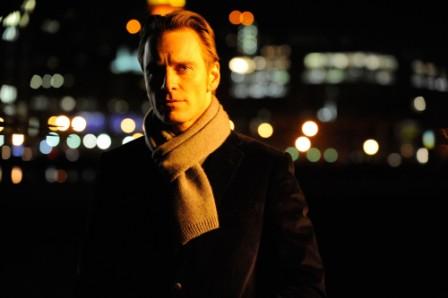
“It all seems so stupid, it makes him want to give up — but why should he give up when it all seems so stupid?” With the holiday season upon us, a lot of films to catch up on. First up in the queue is Steve McQueen’s stylish but mostly hollow addiction drama Shame. Like McQueen’s earlier Hunger (and not unlike Christian Bale’s turn in Brad Anderson’s The Machinist), Shame is a middling film anchored by a strenuous and committed performance by Michael Fassbender. He’s great here, and Shame occasionally has moments of quiet power. But the film as a whole, sadly, is overwrought and mostly silly.
Here, Fassbender is Brandon Sullivan, an Irish-American Silicon Alley midmanagement type living in Chelsea who fills his empty days watching pr0n at work and his lonely New York nights having meaningless sex with hookers and anonymous strangers. Ok, let me stop there for a second: Awwwww, poor damaged rich guy! Nymphomania is such an underappreciated and overlooked #firstworldproblem! Yes y’all, like The King’s Speech, my empathy meter clicked out early here. It doesn’t help that Sullivan is given no real redeeming qualities to speak of — He’s, quite literally, just a prick. (Plus, as someone who actually lived the “depressed in Gotham” existence, I found it less a Boschian purgatory of carnal pleasure and more like I am Legend, but of course there are millions of stories in the Naked City. YMMV.)
Anyway, Brandon’s life is upended when his needy, inconstant, and equally lacerated sister Sissy (Carey Mulligan, also giving more of herself than the project deserves) shows up at his door. Both Brandon and Sissy were clearly damaged at an early age – A childhood of abuse is intimated through nasty scars and sketchy stories. But while Brandon has an insatiable craving for angry, consequence-free sex (in fact, he can’t perform when on an actual, honest-to-goodness date with a co-worker), Sissy is desperate for emotional attachment. In other words, basically these two are like oil and water, and they’re both cooped up in the same smallish NYC apartment with their respective demons. This will not end well.
So the board is set, but, in all honesty, the pieces don’t do much moving. As in Hunger (and much like Tom Ford’s A Single Man), Steve McQueen seems more interested in creating artistic moments than achieving any kind of narrative momentum. Plot isn’t everything, of course. Character studies are fine. even ones involving mostly static characters. But we don’t learn anything about these two characters except they’re troubled and needy. We need more to hold interest here.
The best of McQueen’s artistic vignettes by far are the bookends of the film, when Brandon hunts for a hookup on the subway and gets caught in a game of eyeball with a possible partner (Lucy Walter). Without dialogue, Fassbender and Walter display a microcosm of conflicting emotions — surprise, lust, shame, guilt — through gazes and body language across a crowded train. But, otherwise, we also have to sit through a lot of filler here, like Fassbender going for a half-mile run to MSG and Mulligan crooning all of “New York, New York” in damaged-siren mode (which conjured grim memories of Georgia.) We have long, uninterrupted scenes of Fassbender and Mulligan fighting like cats and dogs. (Quite frankly, they feel like gimmicks, as did Fassbender and Liam Cunningham’s long and more impressive one-take chat in Hunger.) And we have a good bit of sex, all filmed — with one exception in a hotel room — in the seventh-circle-of-hell fashion of another addiction film, Requiem for a Dream.
In short, I just didn’t buy it. The characters did not ring true to me. I couldn’t see Fassbender (hard, angular) and Mulligan (soft, curvy) as siblings. I found it hard to believe Sullivan could be at once suave enough to pick up anyone he wanted at a club (particularly as compared to his inept boss, James Badge Dale), and yet so unbelievably terrible at small talk on a first date. And McQueen’s third-act decision to have Fassbender’s character, in the midst of an epic bender, wander into a ridiculously sinister gay dungeon in the Meat-Packing District for consummation, carried more than a whiff of homophobia about it. Shame has some powerful performances, and I wouldn’t be surprised to see Fassbender and Mulligan get acting nods here. But the film is all surfaces and very little depth. I left, like its wretched protagonist, unsatisfied.

